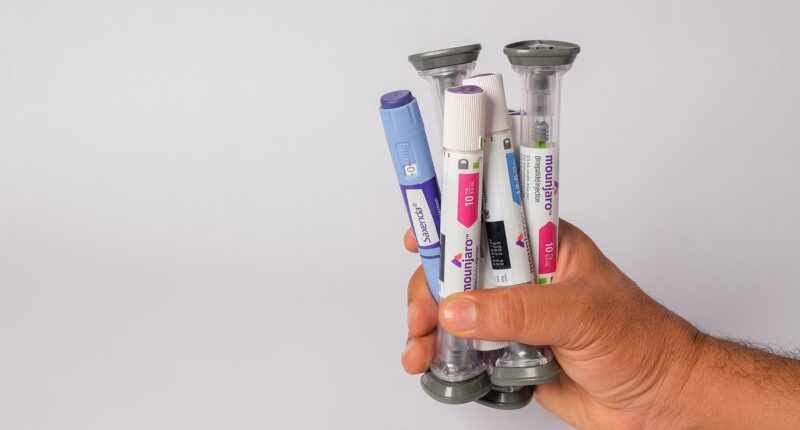Share this @internewscast.com
Dieters may soon have access to mega-dose Wegovy injections after groundbreaking trials revealed that a triple-strength version of this slimming drug enabled patients to shed almost one-fifth of their body weight.
The once-a-week injection, which contains the drug semaglutide, is already prescribed on the NHS at a maximum dose of 2.4mg.
Two significant international studies have demonstrated that increasing the dosage to 7.2mg, which is three times the currently sanctioned amount, results in substantially higher weight loss while maintaining safety.
According to researchers, this ‘mega dose’ could offer a novel solution for individuals who haven’t lost sufficient weight with standard treatments, including those with type 2 diabetes.
The trials involved more than 2,000 adults with obesity, some of whom also had diabetes.
In the study, participants were randomly assigned to receive either the 7.2mg dose, the standard 2.4mg dose, or placebo injections, along with guidance on diet and exercise.
After 72 weeks, individuals without diabetes who took the mega dose lost an average of 18.7% of their body weight. This was in comparison to a 15.6% weight loss on the standard dose and a mere 3.9% with placebo, diet, and exercise.
Nearly half of the participants on the higher dose lost at least 20% of their body weight, and almost a third experienced a weight loss of a quarter or more — surpassing the outcomes observed with the competing Mounjaro jab.

Dieters could be offered mega-dose Wegovy jabs after landmark trials showed a triple-strength version of the slimming drug helped patients lose nearly a fifth of their body weight
In people with type 2 diabetes, the mega dose yielded about 13 per cent average loss, compared with 10 per cent on the 2.4mg jab and under 4 per cent with placebo.
Waistlines shrank more, while blood pressure and cholesterol – key drivers of heart attacks and strokes – and blood sugar improved markedly.
Among participants with pre-diabetes, over 80 per cent of those on 7.2mg had reverted to normal blood sugar by week 72.
Side effects were more frequent at the higher dose. Nausea, vomiting, diarrhoea and constipation were the most common complaints.
Around one in five patients reported tingling or skin sensitivity. Most problems were mild to moderate and resolved over time, the researchers claimed.
One in 20 patients stopped treatment because of side effects, similar to the standard jab. Serious complications were not increased with the higher dose.
The study authors concluded: ‘Semaglutide 7.2 mg was well tolerated and provided additional clinically meaningful weight loss compared with 2.4 mg, suggesting that higher doses could help patients who do not achieve sufficient weight loss with the currently approved dose.’
However Professor Alex Miras, an obesity expert at Imperial College London, was more cautious.
He told the Daily Mail: ‘Tripling the dose only gives a marginal extra benefit, but the dose increase is massive.
‘Going from 2.4mg to 7.2mg is a very big jump. I’m concerned many patients won’t tolerate such a high dose. In clinical practice people already struggle at 2.4mg.’
He added: ‘Even if 7.2mg is approved, I suspect uptake will be low because of cost and side-effects – the top dose is already expensive.’
Semaglutide is part of a new class of medicines known as GLP-1 receptor agonists, which mimic a gut hormone to regulate appetite and blood sugar.
The drug, sold as Ozempic for diabetes and as Wegovy for weight management, has transformed obesity treatment, driving high demand and sparking debate over access.
But the jab has been hit by controversy after the cost of the highest-dose pens for private patients jumped from about £122 a month to more than £330, sparking anger from users and leading pharmacies to negotiate heavy discounts.
A further combination of semaglutide with cagrilintide, an analogue of the hormone amylin – which helps regulate appetite and blood sugar – is being tested under the name CagriSema.
Early data suggest average losses of around 23 per cent of body weight – greater than either Wegovy or Mounjaro.
Professor Miras said: ‘What patients and clinicians are really waiting for is CagriSema, which looks likely to outperform both Wegovy and Mounjaro.’
In the UK, fewer than 200,000 people are thought to be accessing weight-loss jabs through the NHS, but over 1.4 million are estimated to be using them privately, according to the health think-tank the King’s Fund.
The researchers behind the latest studies stressed that longer-term data will be needed to confirm whether the 7.2mg dose’s benefits persist.
Regulators would also need to approve any licensing changes before doctors could prescribe it.












